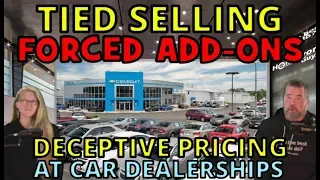ILLEGAL TIED SELLING (FORCED ADD ONS)

TIED SELLING, FORCED ADD-ONS, & DECEPTIVE PRICING PRACTICES AT CAR DEALERS
What is Tied selling? Is Tied Selling Illegal? Here’s the response you get: Tied selling is the illegal practice of a company providing a product or service on the condition that a customer purchases some other product or service. It is frequently used in reference to banks and is sometimes referred to as coercive tied selling.
Studying how a bank uses tied selling is very revealing as to how a car dealer does the same thing. A Google search for how a bank uses tied selling reveals this answer: Coercive Behavior & Tied Selling
The following demonstrates how coercive tied selling works: Your bank’s mortgage specialist tells you that you qualify for a home mortgage. However, you are also told that the bank will approve your mortgage ONLY if you transfer your investments to the bank or its affiliates.
Wow, don’t car buyers hear a very similar story in dealer finance? The Finance Office is famous for saying things like. “The bank will give you this attractive interest rate, but only if you buy this Extended Warranty plan.” Or, an alternate statement, “The bank will finance your car deal, but only if you protect your investment with an extended warranty plan.” There are a few problems with this kind of statement. What are they Liz?
First,It is illegal to coerce someone into buying a product (like a warranty) just because they are buying the car. Secondly, literally everyone should know that the extended warranty or service plans dealers sell are often NOT worth the paper they are written on. We’ve covered the deficiencies of these plans before in this show EXTENDED WARRANTIES: An EXPENSIVE GAMBLE FOR CAR BUYERS? We shared in that show that it’s not just us that says extended warranties are a bust, but so does Consumer Reports. Consumer Reports says that 70% of the people who buy one would never do it again! The 3rd reason is that a warranty or service plan of any kind can add thousands of dollars to your loan balance without doing anything to improve the value of your car. If something happens, and your loan balance is $25,000 and your car is only worth $17,000, you have a huge problem on your hands. And, because the Finance Officer used the warranty argument to get you to add to your loan balance, he or she will also likely say, NOW you need GAP insurance so you are covered in the event of accident. The dealer provided GAP policy comes with an extra price tag of $1,000 to $1,500, inflating your loan balance even higher!
If the Finance Officer uses the argument that an extended warranty or service plan only adds $25 per month to your car payment, we suggest you use this idea to save the money and simply say, “I’ll go one better, I’ll put $50 per month in a savings account and build myself a maintenance nest egg.” That is precisely what we do. We have the vehicle properly inspected prior to purchase. We maintain it to keep it running good, we drive it nice so it lasts, and we put away money each month into savings to cover unforeseen expenses.
We said we’d provide some useful analogies that viewers could easily understand. Let’s start with an example provided by the FTC: The FTC challenged a drug maker that required patients to purchase its blood-monitoring services along with its medicine to treat schizophrenia. The drug maker was the only producer of the medicine, but there were many companies capable of providing blood-monitoring services to patients using the drug. The FTC claimed that tying the drug and the monitoring services together raised the price of that medical treatment and prevented independent providers from monitoring patients taking the drug. The drug maker settled the charges by agreeing not to prevent other companies from providing blood-monitoring services.
To better understand how it applies to a car dealership, just substitute a dealer product for the two products outlined in this FTC statement, and you’ll see the parallel here. If the drug maker required patients to purchase blood-monitoring services (a second product or service, somewhat like an extended warranty) along with the medicine (the first product, like a car). The FTC claimed that tying the drug (the first product, like a car) to a second product (like monitoring services) unfairly raised the price of the medical treatment, just as a forced add-on at a dealership unfairly raises the price of the car, fattening your loan balance, and preventing independent providers from selling the other product (like an outside warranty company competing with the dealer for your business). Or an auto parts store offering much cheaper mud flaps or pin-striping that the dealer is trying to force upon you for hundreds of dollars by saying “It’s already on the car. We put it on all of our cars.”
To defend against this, I always look up Tied Selling on Google when confronted with a forced tied sale. Because a salesman is largely ignorant of the law and really isn’t the decision maker, I show the search results to a manager there. No dealer has ever gotten away with telling me that something is already on the car if I don’t want it, and I provide plenty of examples about how stupid it is. Let’s cover some of those for our viewers.
One of my favorites is the hot dog analogy at the grocery store.
The Hot dog story is a great illustration of how stupid tied selling is, and WHY it is illegal, and how nobody but a car dealer does it and gets away with it. Here’s my hot dog analogy. I say to the dealer, If I was at the grocery store to buy hot dogs, I’d only pick up the hot dogs, pay for them, and leave the store. Nobody would ever get away with saying to me :”Ma’am, we can’t sell you those hot dogs unless you also buy the Ketchup and Mustard we have on aisle 4, and a bag of hot dog buns from the bread aisle. That’s what everyone else does, and we expect you to do it that way, too.” I add that last statement because dealers like to say, “That’s what MOST of our customers do.”
Nothing but Nonsense!
Yes, just as it is for a dealer attempting to require me to buy a second or third product or service from them just because I’m there to buy a car. Add Tied Selling to your homework friends, even print it out in advance, and no dealer will ever get you with a forced add-on again!
Alright lets give another analogy for those who are still struggling with it.
Ok, let’s hit the shavers at a general store. No checkout clerk will ever tell me “Ma’am, we can’t sell you those razors unless you also get the shaving cream we are running a sale on. We sell them together, because that’s the way most customers buy them.”
Such a classic! For our viewers, if you’ve been pushed into the purchase of a forced Add-on at a car dealership, you should know that many of them can be canceled after the fact, particularly if it’s a type of insurance or protection package. If it’s been years since you bought those things, you’ll still get a prorated amount of money back. We’re talking specifically about Extended Warranties, GAP insurance policies, Accidental Death policies, Job Loss Insurance, Tire and Wheel protection, Glass breakage protection, Road Hazard protection. ANY product similar to these products can be canceled. By the way, if a forced add-on sale happened to you, share your story in the comment section below, and if you would, please include the dealers name and the city & state they are in. We’d love to help OUT the bad actors!
And that’s our report on Tied Selling and forced Add-ons for today!
If you found this to be useful, please share this report with your friends on Facebook or other social media.
Much appreciated!
